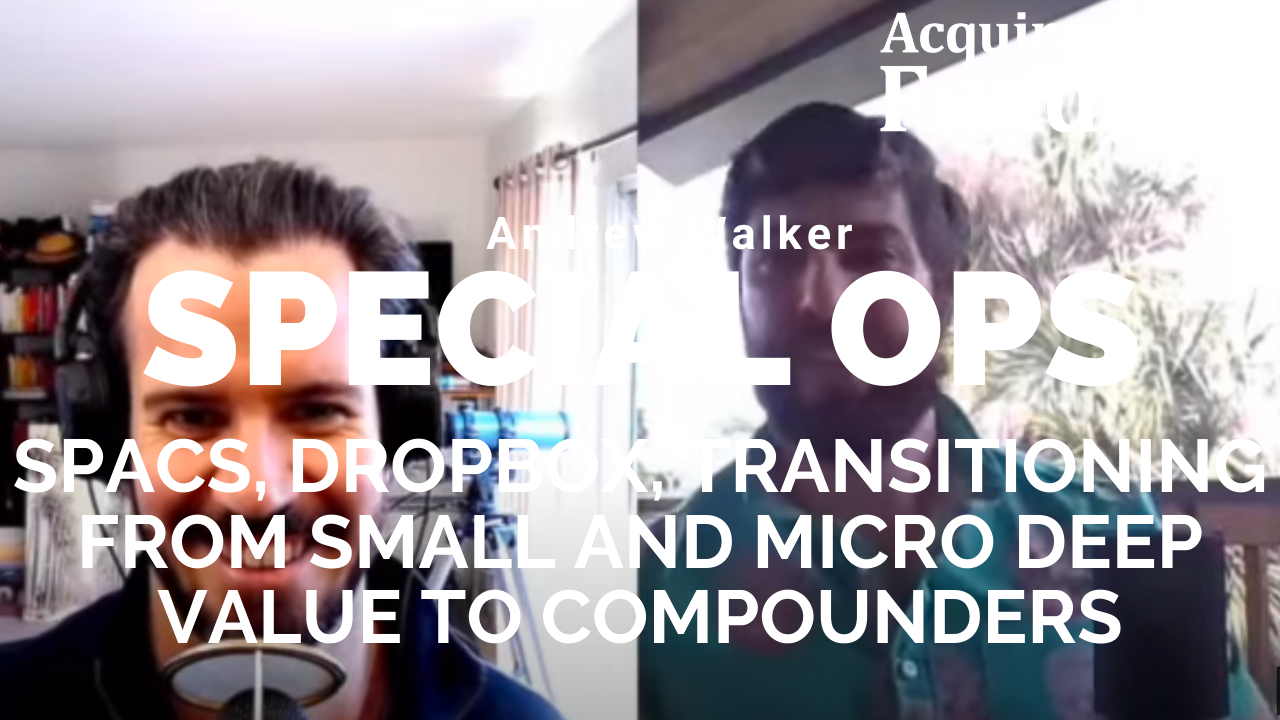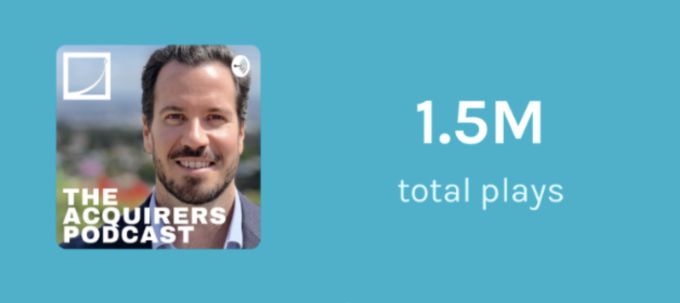During his recent interview with Tobias, Andrew Walker, Portfolio Manager at Rangeley Capital discussed Opportunities In SPACs. Here’s an excerpt from the interview:
Tobias: When I first encountered SPACs was probably a little bit more than a decade ago, when the way that you played SPACs was you found the ones that were getting close to the two-year period that they had to actually do a deal. They all traded at a big discount to basically the cash that they had to return, and so you played these busted SPACs, so that you basically got– they’re little special situations where you basically got the $10 back. What’s changed? What’s the focus now?
Andrew: Well, I think that’s the way most people played them until about a year ago, I’d say with– Chamath’s IPOA which turned into Virgin Galactic SPCE, which he bought it, it captured the retail mentality, and it went from 10 to 30 in a day. I think that’s the one that really changed the dynamics for these things. Now, what it’s become is a SPAC is, it’s $10 sitting in trust, that if you announce a merger with anything that’s connected to an electrical vehicle play, it’s worth $30 per share the next day. It’s almost a license to make money.
I’m obsessed with them because, A, like Pershing Square Holdings right now, that has $20 per share in trust value, and that’s a very unique structure we can talk about, but it trades at $25 per share right now. Investors are saying, Bill Ackman’s the one who runs Pershing Square, “We like you so much, that the $500 million you’re sitting on, we’re going to value that at a $700 million. Not only that but when you do this deal, we’re going to get diluted down because the founder shares are going to dilute us down. We actually think you’re going to be able to announce a deal that so good, that you’re basically going to create 40% of value out of thin air.”
You see a lot of these, the EV SPACs, they’re all agreeing to mergers that value them at a billion and the next day, the market’s saying, “No, you’re worth 4 or 5 billion.” And it’s just insane to me that two rational parties, if you and I announced a deal at $100 million, and the market came around and valued that deal at $300 million, it would just seem weird to me.
Tobias: Yeah. Is that something that is sustainable, do you think?
Andrew: I don’t think it’s sustainable. So, this year, I think– I don’t have the stats for it, but I think there’s going to be 300 SPAC IPOs. In a normal year, I think there’s something like 80 normal IPOs, 80 to 120. So, if you think about that, there’s going to be almost three times as many SPAC IPOs as normal IPOs this year. There’s not three times as many IPO-able companies.
At some point, there has to be a reckoning where there’s just not enough companies to go public through these SPACs. I’ve been thinking, do I want to do a 2021 piece? If I did, one of my predictions for 2021 is, a lot of these SPACs that haven’t announced deals are just going to– they’re going to go without deals and they’re going to have to liquidate and pay their $10 per share back, or they’re going to announce deals, and at some point investors are going to say, that company is not a public-ready company. You pay too much all this.
I think we’re going to see a lot of SPACs end up liquidating, would be one of my predictions for SPACs. That doesn’t mean there aren’t going to be great SPACs in there, but I do think we’re going to see a lot of SPACs liquidating on the back end of this.
Tobias: With a SPAC-focused fund, how do you parse the opportunities?
Andrew: I help a lot on the SPAC-focused fund, but Chris actually manages the SPAC-focused fund. I don’t want to put words in his mouth, per se. What it originally started as was, hey, we’re going to go by– again, this was before the SPC mania. It was, hey, we’re going to do a lot due diligence on the managers. We’re going to invest in managers we like at $10 per share.
We’re going to have this parked in trust, and if they announce a deal we like, great. But most likely, what we’re looking to do is fund the deal and not take a lot of upside risk. Again, I don’t want to speak particularly to the SPAC-focused fund. I’m happy to talk my views on SPAC, but I don’t want to speak to the SPAC-focused fund if that makes sense.
Tobias: All right. Well, let’s talk Special Ops. Let’s talk about the strategy in Special Ops, and where you’re finding opportunities.
Andrew: Yeah. Well, not to bring it back to SPACs, again, the strategy for Special Ops, it varies. I always want to pay– I want to buy something for less than it’s worth is the overall strategy, I’m a value investor. It varies over time. When I launched Special Ops, I thought the definition of that was, I buy things for four times price earnings when the market’s at 10 times price earnings, or I buy net-nets, and over time that’s evolved.
You can find out more about Tobias’ podcast here – The Acquirers Podcast. You can also listen to the podcast on your favorite podcast platforms here:
For all the latest news and podcasts, join our free newsletter here.
Don’t forget to check out our FREE Large Cap 1000 – Stock Screener, here at The Acquirer’s Multiple:




